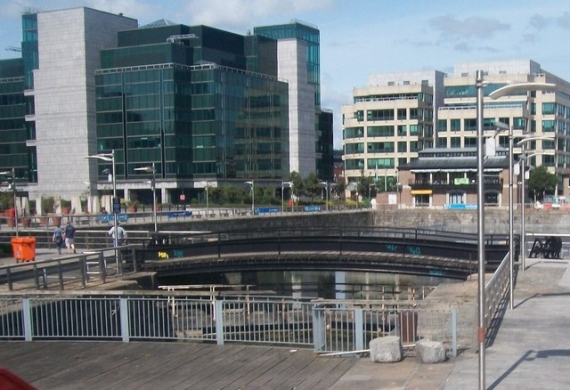
Russia's bailed-out bank Otkritie will not repay $500 million of loans raised in Ireland, potentially making it harder for other Russian private banks to borrow abroad and casting a cloud over Dublin as a "shadow banking" hub.
Otkritie's refusal to pay sees shockwaves from Russia's biggest ever bank bailout reach Ireland, which has been used by international firms including Russian banks to raise hundreds of billions of euros in such loans.
In a stock-exchange filing on Tuesday, OFCB, a vehicle that had issued $300 million of loan notes and lent the proceeds to Otkritie, said the Russian bank had "terminated" the repayment of the debt and more than $7 million of interest.
BKM Finance, another vehicle that borrowed $200 million on behalf of Otkritie, made a similar filing on Oct. 27, saying the bank could not repay the money and interest of $4.7 million.
A spokeswoman for Otkritie said it had "grounds to terminate its obligations related to subordinated instruments" and that it had acted in accordance with the law.
Russia's central bank, which orchestrated a multi-billion dollar rescue of Otkritie after a run on the bank, had earlier warned that subordinated debt could be hit.
OFCB has issued a further $500 million of subordinated debt, according to Otkritie's website, although the status of this was not immediately clear.
Otkritie's fall was dramatic for a group that, with support from President Vladimir Putin's inner circle, snapped up rivals and even Lukoil's diamond business to become Russia's biggest private bank.
"As Russia is gearing to raise more capital through international bonds ... this may well dampen investors' appetite for Russian assets," Anastasia Nesvetailova, an expert in financial crises at London's City University, said.
Sergey Dergachev, a bond investor with Germany's Union Investment, said he feared others could suffer a similar fate.
"If global economic conditions worsen, what will happen to Russia and its banks? I think the chances of seeing more subordinated debt out of Russian banks are slim."
Also potentially at stake is Ireland's shadow banking system, which has boomed since the financial crisis and given groups such as hedge funds increasing clout in global finance.
The International Monetary Fund and Financial Stability Board, which monitors the financial system, have highlighted concerns over Ireland's outsized financial sector.
The country is one of the euro zone's largest centres for financial special purpose vehicles, according to central bank data, many of which are used to borrow by international groups.
The sector had total assets such as loans of 345 billion euros in the middle of this year - bigger than the Irish economy. Russian companies have sponsored 14% of those vehicles in Ireland.
But fund raising by companies such as Otkritie, poses a potential threat to Ireland's standing, said James Stewart of Trinity College Dublin who has written a report on the issue.
"In terms of Ireland's reputation, these cases indicate a problem," said Stewart.
"It reveals the absence of regulation and oversight of this important market. They create a systemic risk, if not to Ireland, then internationally."
The Irish Stock Exchange, which listed the debt, declined to comment, while a spokeswoman for Ireland's central bank said the debt issues were restricted to "qualified investors" and that it had approved the prospectuses.
"The veracity of that information is the responsibility of the issuer and its directors," said a spokeswoman.
The Irish law underpinning special purpose vehicles was created by the government in the early 1990s to build an international financial services centre in a then derelict part of Dublin, a central plank to the country's economy and success.
Many vehicles are shell companies set up to borrow and critics, including Stewart, say similar conduits hosted by Ireland helped trigger bank problems in Germany during the financial crisis.
However, lobbyists, lawyers and many government officials want to keep the regime to attract business from London after Britain leaves the European Union. (Reuters)
Source: www.businessworld.ie

















